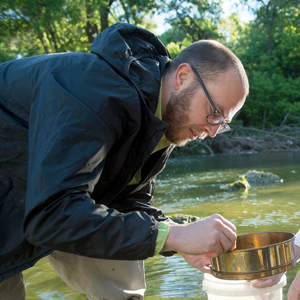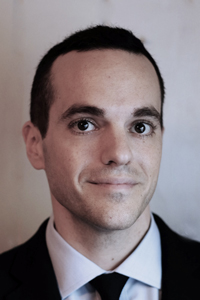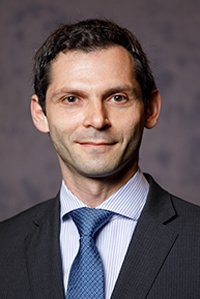 The College of Arts and Sciences recently selected the 2022-2025 cohort of Distinguished Teaching Fellows.
The College of Arts and Sciences recently selected the 2022-2025 cohort of Distinguished Teaching Fellows.
Kaleb Heinrich
Kaleb Heinrich is an assistant professor in the Department of Biological Sciences. His areas of research include biology education, active learning, and outreach in STEM, biology graduate student professional development, and freshwater ecology. At UA, he teaches Principles of Biology I and II, Biology Outreach, General Ecology Lab, and Pedagogy in the Biological Sciences.
Teaching Philosophy
Typical science courses emphasize memorizing facts when learning is actually driven by being observant, thinking, linking concepts, and asking good questions. I want to provide a welcoming classroom where students can learn and develop the ability to solve problems, and that requires making connections and seeing things differently. It is my priority in the classroom to make the subject relevant to the real world, as well as stress the practicality and importance of science as it relates to us. I do not want the classes I teach to be viewed as ‘requirements’ for graduation but rather as valuable tools that can be used and applied throughout my students’ lives.

Lawrence Cappello
Lawrence Cappello is an assistant professor in the Department of History. His focus is U.S. Legal & Constitutional History — particularly the right to privacy. He is the founder and director of UA’s Legal History Concentration, and author of None of Your Damn Business: Privacy in the United States from the Gilded Age to the Digital Age (University of Chicago Press). Among his course offerings are U.S. Constitutional History I & II, the Right to Privacy, and the Great Cases in U.S. Legal History. He received his PhD from the City University of New York.
Teaching Philosophy
To teach students how legal scholars think is to teach them how to be inherently skeptical. And a practiced sense of skepticism, when properly fleshed-out, can instill a strong sense of pride and individuality. My approach to teaching draws heavily from Socratic discussion methods designed to instill critical thinking habits that will persist well after the semester ends. Critical thinking skills should be packaged as a way for students to understand the nuances of where power really lies, to be less susceptible to group think, and to construct their own individual intellectual identities, regardless of their major. The goal is for students to leave the classroom with a keen understanding that intellectual complexity and viewpoint diversity are not vices.
 Sergei Gleyzer
Sergei Gleyzer
Sergei Gleyzer is an assistant professor in the Department of Physics and Astronomy.
Teaching Philosophy
My goal is to inspire and encourage my students to think critically about the world around them and use science and technology as means of understanding it. This requires critical thinking and use of scientific methodology with real-world examples. I strive to teach the students how to analyze the world around us and use modern tools, such as machine learning, to acquire new insights into solving various challenges in a variety of disciplines. My goal is to help students to explore the physical world and discover their own interests, strengths, and weaknesses, in a way that makes this experience more meaningful.
I frequently use technology and tools, such as python, github, Slack, Zoom, Jupyter and Google Colaboratory to provide the students with an interactive learning experience. I have used these tools in various settings: during the introductory physics courses for non-majors, in graduate and undergraduate machine learning courses I have developed at UA, and in interactive hands-on sessions.
I strive to teach the students not only the concepts and the technical skills needed to apply these ideas to real-world data, but how to ask the right kind of questions or pose an existing challenge in a way that can be solved with the tools and technology that they have learned. This allows the students to explore the subject on their own terms and by following their own interests and be more inspired to apply technology to the real-world challenges.